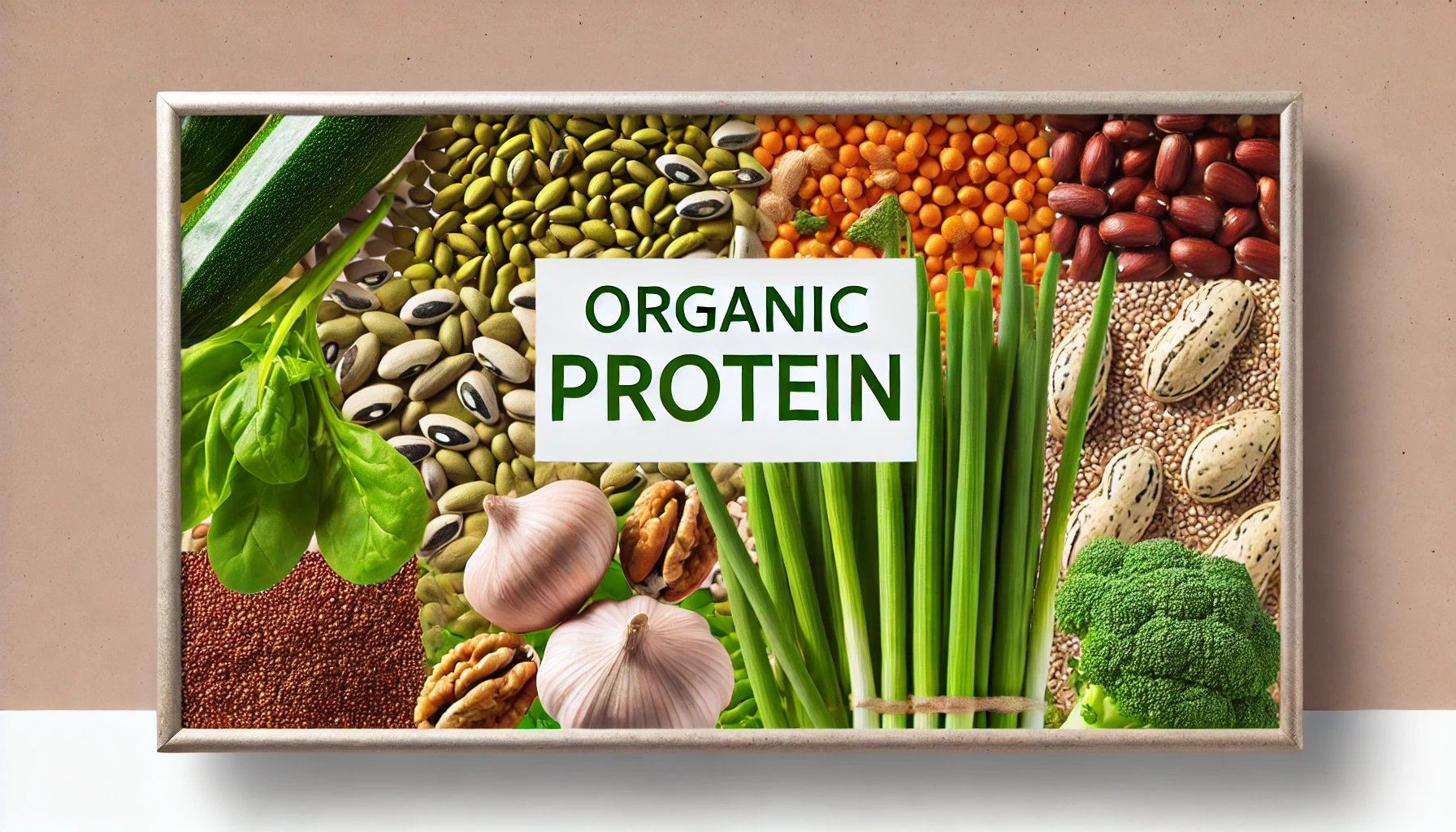Organic Protein
Introduction
Organic protein is rapidly gaining popularity among health-conscious individuals, athletes, and those seeking sustainable, clean sources of nutrition. Derived from organically grown plants and animals, this type of protein ensures that the consumer is not exposed to harmful chemicals such as pesticides, synthetic fertilizers, or genetically modified organisms (GMOs). Whether you’re a fitness enthusiast looking to enhance muscle recovery or someone striving for better overall health, incorporating organic protein into your diet can offer numerous benefits. This blog delves deep into the world of organic protein, exploring its sources, benefits, and much more.
Not only is organic protein beneficial for the body, but it also promotes environmental sustainability. Organic farming practices focus on preserving soil quality, reducing water pollution, and fostering biodiversity. The choice of organic over conventional protein sources can contribute to the reduction of your ecological footprint. Furthermore, organic protein products often come from animals raised without antibiotics or hormones, leading to a cleaner and more humane food chain.
Why Organic Protein?
Choosing organic protein is about more than just what you exclude from your diet; it’s also about what you include. Organic proteins are derived from sources that adhere to strict organic farming standards, which promote ecological balance and conserve biodiversity. These standards ensure that the food is not only free from harmful additives but also richer in nutrients. Studies suggest that organic meat and milk can have about 50% more omega-3 fatty acids than their conventionally raised counterparts.
Environmental Impact and Ethical Considerations
Opting for organic protein also has significant environmental and ethical implications. Organic farming practices are designed to reduce pollution and conserve water and soil quality. Moreover, they often provide a more humane treatment of animals, which appeals to ethically-conscious consumers. By choosing organic protein, individuals contribute to a sustainable agricultural system that respects the planet and its inhabitants.
Navigating the Market
As the popularity of organic protein grows, so does the variety of products available. This abundance can be overwhelming for consumers. Understanding labels and knowing which products are truly organic and worth the price is crucial. This section will guide you through the complexities of choosing the right organic protein sources to match your dietary preferences and lifestyle.
Understanding Organic Protein
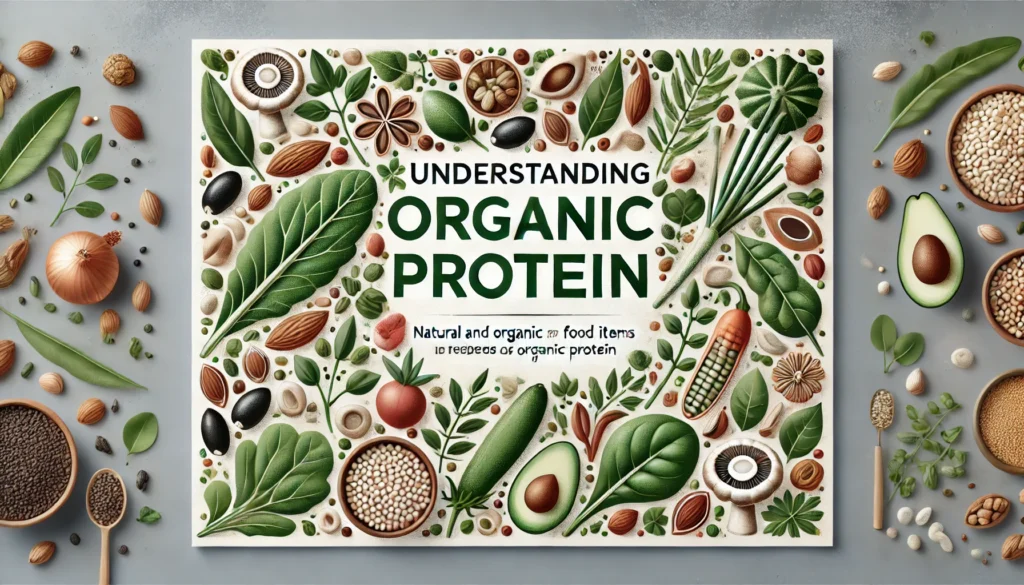
Definition and Standards
Organic protein is derived from animals or plants that have been raised or grown according to specific regulatory standards set by certifying bodies such as the USDA in the United States or the Soil Association in the UK. These standards emphasize the restriction of synthetic chemicals, hormones, antibiotics, and genetically modified organisms (GMOs). For animal-derived proteins, this includes raising livestock on organic feed, with access to the outdoors, and under humane conditions. Plant-based organic proteins must come from crops grown without synthetic pesticides or fertilizers, ensuring a natural growth process.
Comparison with Conventional Protein
Organic proteins differ significantly from their conventional counterparts in terms of production and processing. Conventional protein sources often come from animals raised in confined conditions and treated with antibiotics and growth hormones to maximize growth and prevent disease. Similarly, conventional plant proteins often come from farming practices that rely heavily on chemical fertilizers and pesticides. These practices can lead to residues in the final products, which are absent in organic proteins, making them a cleaner alternative for consumers looking to minimize their intake of synthetic substances.
Certification Processes
Obtaining organic certification is a rigorous process that involves multiple steps to ensure strict adherence to organic farming and processing standards. Producers must demonstrate that they follow organic practices across their operations, including source verification for seeds and feed, the use of natural pest control methods, and the maintenance of animal welfare standards. Certifying agencies conduct regular inspections to ensure compliance. This certification process helps build trust among consumers, ensuring that the organic products they purchase meet all the necessary standards of organic production.
Benefits of Organic Protein
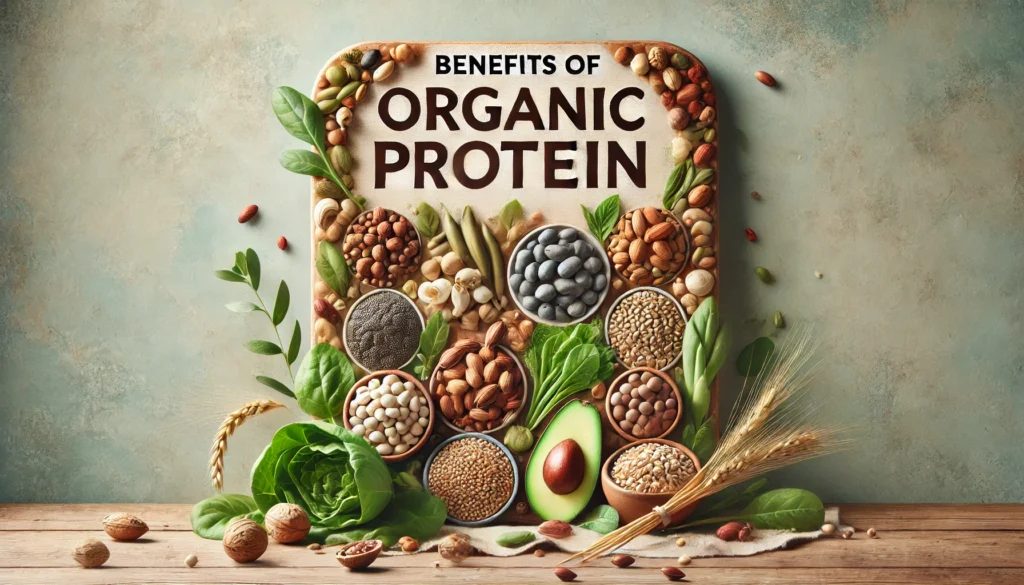
Nutritional Advantages
Organic proteins are often considered more nutritious than their conventional counterparts. The absence of synthetic chemicals and the use of natural farming methods can lead to higher levels of certain nutrients. For instance, organic meats are often richer in omega-3 fatty acids, which are crucial for cardiovascular health. Organic plant proteins can also have higher levels of antioxidants, as plants raised organically may produce more natural compounds to defend against pests.
Absence of Harmful Additives
One of the most significant benefits of organic protein is the absence of harmful additives that are commonly found in conventional protein sources. These include synthetic hormones, antibiotics in animal protein, and pesticides in plant-based sources. Consuming organic protein reduces exposure to these substances, which have been linked to various health issues, including antibiotic resistance and hormonal disruptions.
Enhanced Omega-3 Fatty Acids
Studies have shown that organic meat and dairy products contain higher levels of omega-3 fatty acids compared to their non-organic counterparts. This is partly due to the organic feed, which includes a higher proportion of grass and alfalfa, foods naturally high in omega-3s. Omega-3 fatty acids are essential for brain function and are known to reduce inflammation, which can prevent chronic diseases such as heart disease and arthritis.
Best Sources of Organic Protein
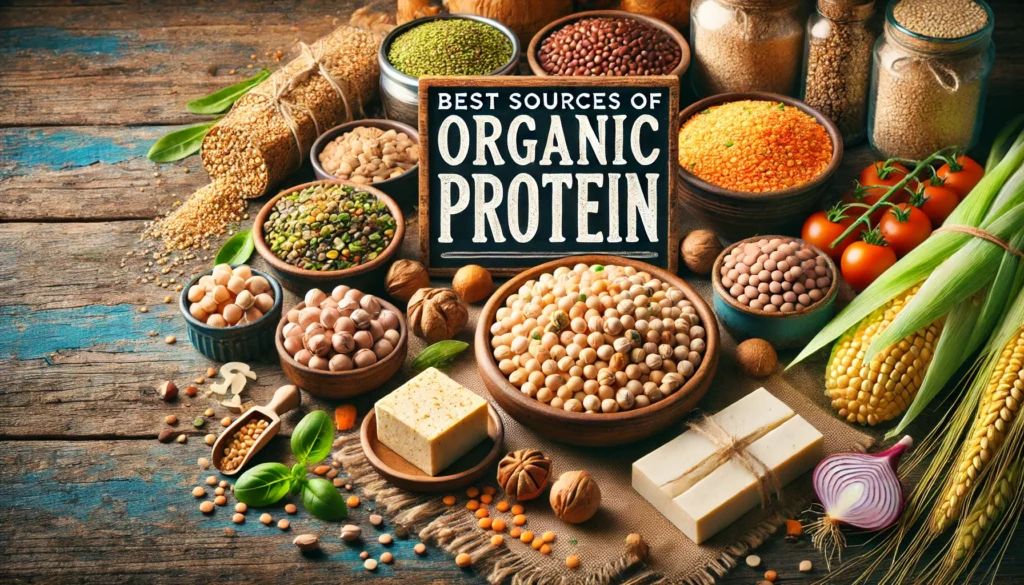
Plant-Based Options
When it comes to organic plant-based proteins, the variety is vast and suited for every dietary need. These sources are not only rich in protein but also in other nutrients, making them a holistic addition to any diet.
- Legumes: Beans, lentils, and chickpeas are staples in the plant-based protein world. They are versatile, affordable, and rich in fiber and protein.
- Quinoa: Often referred to as a “superfood,” quinoa is a complete protein, meaning it contains all nine essential amino acids that the body cannot produce on its own.
- Nuts and Seeds: Almonds, chia seeds, flaxseeds, and hemp seeds are excellent sources of protein, healthy fats, and other vital nutrients.
Animal-Based Sources
Organic animal-based proteins come from animals that have been raised in humane conditions without the use of antibiotics or synthetic hormones, on organic feed.
- Organic Meat: Includes beef, chicken, and pork from animals that have been given organic feed and have had access to the outdoors.
- Dairy Products: Milk, cheese, and yogurt from organically raised cows or goats offer high-quality protein and essential minerals.
- Eggs: Organic eggs come from chickens that are raised on organic feed and have the freedom to roam outdoors, contributing to richer and more nutritious eggs.
How to Identify Genuine Organic Products
To ensure you’re buying genuine organic protein sources, it’s important to look for specific certifications and understand labeling practices.
- Certification Labels: Look for labels such as USDA Organic in the USA, which indicates that the product meets strict governmental standards.
- Third-Party Certifications: Certifications from organizations like Non-GMO Project also add credibility to organic claims.
- Traceability: Many organic brands provide traceability tools on their websites where you can see the product’s journey from farm to table.
Environmental Benefits
Impact on Soil Health
Organic farming practices have a profound impact on soil health, which in turn supports more sustainable agriculture.
- No Synthetic Fertilizers: Organic farms use natural fertilizers like compost and manure, which enrich the soil without the harmful effects of synthetic inputs.
- Crop Rotation: This practice is commonly used in organic farming to maintain soil fertility and to prevent soil diseases and pests.
- Cover Crops: Growing cover crops like clover or vetch helps fix nitrogen in the soil and prevents erosion.
Biodiversity Preservation
Organic farming helps preserve biodiversity, ensuring the survival of a wide variety of species.
- Diverse Habitats: Organic farms often maintain and introduce natural habitats, which attract and protect native wildlife.
- Pollinator Protection: By avoiding pesticides, organic farms protect pollinators like bees and butterflies, which are essential for the pollination of many crops.
- Genetic Diversity: Organic farming encourages the use of heirloom and traditional plant varieties, contributing to genetic diversity in the food supply.
Water Conservation
Organic farming practices also contribute to water conservation, which is crucial for sustainable agriculture.
- Reduced Runoff: By avoiding synthetic pesticides and fertilizers, organic farming minimizes runoff that can lead to water pollution.
- Soil Management: Healthy soils have a better structure, which allows them to hold more water and reduce water use.
- Water Recycling: Organic farms often use innovative water recycling methods to maximize efficiency.
Ethical Aspects of Organic Protein Farming
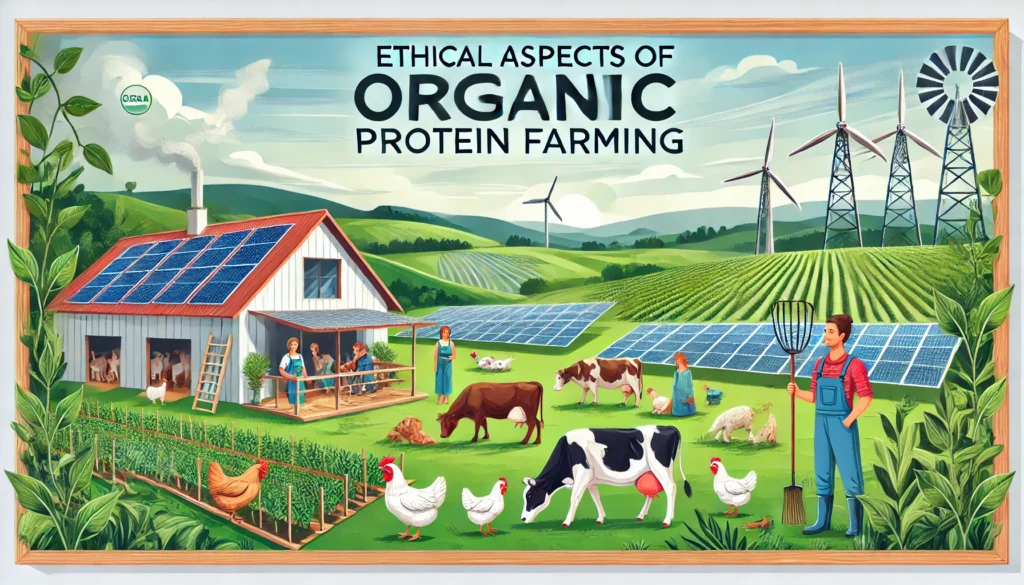
Animal Welfare
Organic farming places a strong emphasis on animal welfare, ensuring that animals are raised in conditions that allow for natural behaviors such as grazing, roaming, and nesting. Unlike conventional farming, where animals may be confined to cramped spaces, organic standards require adequate space, access to the outdoors, and organic feed. This not only leads to healthier animals but also to higher quality protein sources for consumers. The humane treatment of animals in organic farms is not just about ethics; it also impacts the quality of the protein, with stress-free animals often providing better nutritional value.
Farm Workers’ Health and Safety
Organic farming practices also benefit farm workers by reducing their exposure to harmful chemicals and pesticides commonly used in conventional agriculture. Pesticide exposure has been linked to a range of health issues, including respiratory problems, skin conditions, and long-term diseases. Organic farms eliminate these risks for workers, creating a safer and healthier working environment. Furthermore, organic farming often employs more labor-intensive techniques than conventional farming, potentially leading to more job opportunities in rural areas.
Supporting Small and Local Farmers
Buying organic protein often supports small and local farmers who choose to engage in organic practices. These farmers typically operate on a smaller scale than large agribusinesses and face significant competition from them. Choosing organic helps ensure that small farmers receive fair prices for their products, contributing to more sustainable local economies. By supporting these farmers, consumers help maintain agricultural diversity and promote a food system less dependent on large monocultures and mass farming operations.
Incorporating Organic Protein into Your Diet
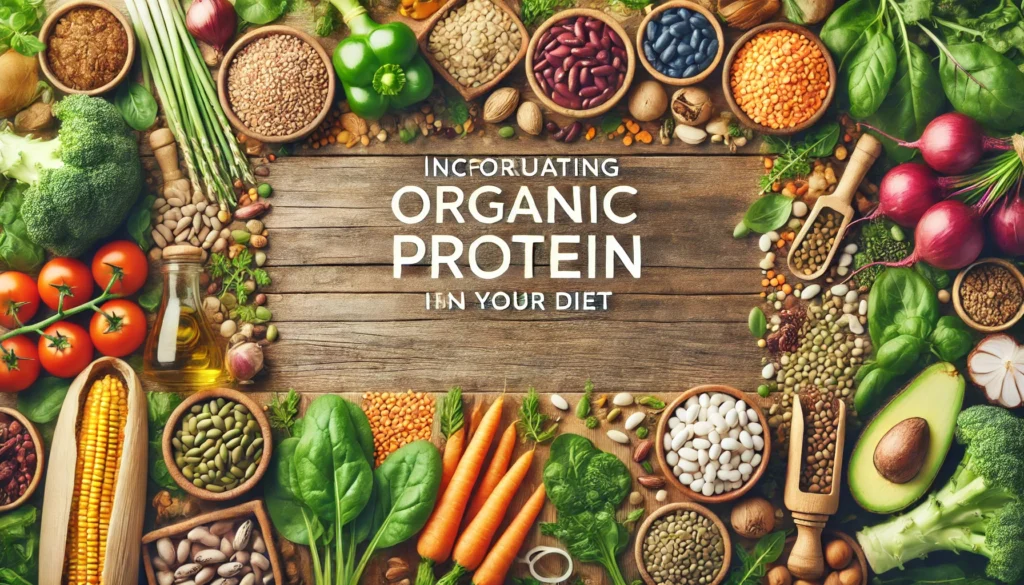
Daily Protein Requirements
Understanding your daily protein requirements is crucial when incorporating organic protein into your diet. These requirements vary by age, gender, physical activity level, and overall health. For example, athletes may need more protein to support muscle repair and growth, while older adults might need it to maintain muscle mass and function. A general guideline is that adults should consume about 0.8 grams of protein per kilogram of body weight per day. However, consulting with a healthcare provider can provide personalized recommendations.
Organic Protein in Meal Planning
Integrating organic protein into meal planning doesn’t have to be complicated. Start by identifying organic sources that fit your dietary preferences—whether it’s plant-based proteins like lentils and beans or animal-based sources like organic meat or dairy. Plan meals around these proteins by balancing them with whole grains, vegetables, and healthy fats. For instance, an organic chicken breast can be served with quinoa and steamed organic vegetables, or black beans can be used to make a hearty organic chili.
Recipes and Preparation Tips
Here are some recipe ideas and tips for preparing meals with organic protein:
- Grilled Organic Chicken Salad: Marinate organic chicken breasts in olive oil, lemon juice, and herbs, then grill them and serve over mixed greens with nuts and a vinaigrette.
- Organic Lentil Soup: Use organic lentils, carrots, onions, and celery to make a nourishing soup, seasoned with herbs and spices for flavor.
- Organic Tofu Stir-Fry: Marinate organic tofu in soy sauce, garlic, and ginger, then stir-fry with a variety of organic vegetables like bell peppers and broccoli.
- Preparation Tips: When preparing organic proteins, it’s essential to cook them at the right temperatures to preserve their nutrients while ensuring they are safe to eat. Avoid overcooking, which can lead to loss of moisture and nutrients, particularly in lean organic meats.
Organic Protein for Special Diets
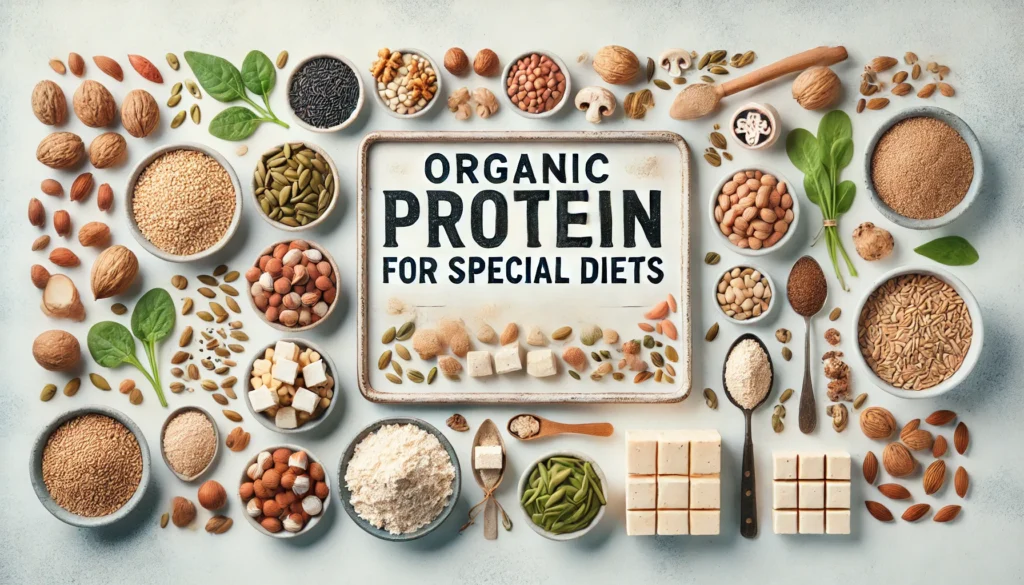
Navigating the realm of organic protein can be particularly crucial for individuals on special diets, such as vegans, vegetarians, those who are gluten-free, or have specific allergen considerations. Here’s how organic protein fits into these specialized dietary needs:
Vegan and Vegetarian Options
For vegans and vegetarians, finding adequate protein sources is a primary concern, and organic options can offer both variety and quality. Organic plant-based proteins like lentils, chickpeas, quinoa, and soy products such as tofu and tempeh are grown without harmful pesticides and are non-GMO, ensuring a cleaner and often more nutrient-rich option to support a plant-based diet. Additionally, organic nuts and seeds are excellent sources of protein and essential fatty acids, providing both nutrition and flavor to vegetarian or vegan meals.
Gluten-Free Sources
Those on a gluten-free diet often struggle to find protein sources that do not risk cross-contamination with gluten-containing grains. Organic protein sources like organic rice protein, pea protein, and hemp protein are inherently gluten-free and safe for individuals with celiac disease or gluten sensitivity. By choosing organic, consumers can avoid the chemical residues often found in conventionally farmed crops, which is especially important for those with health sensitivities.
Allergen Considerations
Organic protein is also vital for people with allergies to additives and preservatives often found in non-organic foods. Organic labels guarantee the absence of synthetic fillers and unnecessary chemicals, making them safer for those with allergies. Moreover, for those allergic to dairy or eggs, organic plant-based proteins provide a safe and healthful alternative.
Cost Analysis of Organic Protein
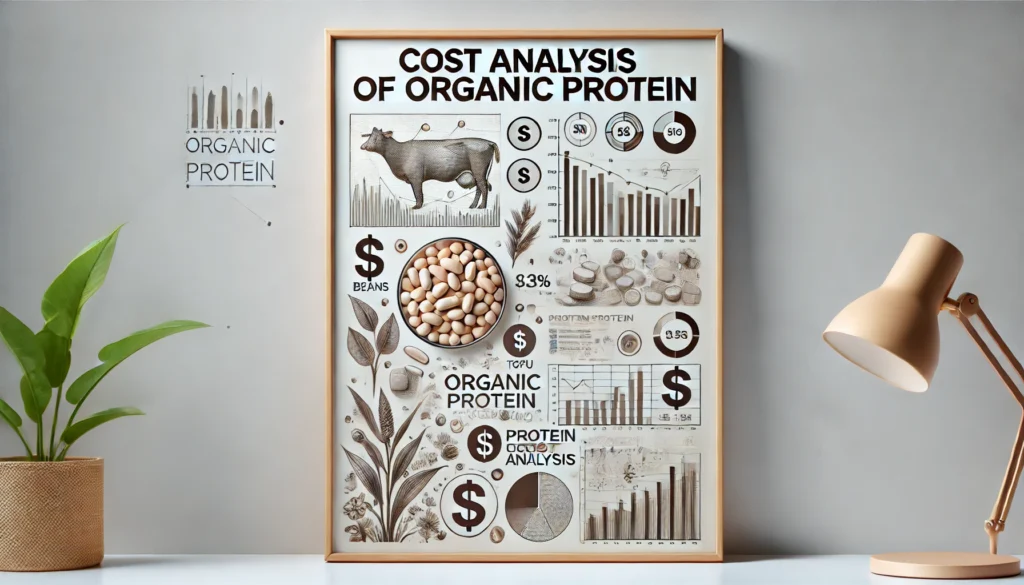
While organic protein offers numerous health and environmental benefits, it often comes at a higher price point. Understanding the cost implications can help consumers make informed decisions:
Price Comparison with Non-Organic Protein
Organic proteins generally cost more than their non-organic counterparts due to more stringent farming practices, lower yields, and the absence of synthetic growth accelerants or fertilizers. For example, organic chicken might cost 20-50% more than conventional chicken due to the higher cost of organic feed and the longer time required to reach market weight under organic standards.
Budgeting for Organic Products
Incorporating organic protein into a diet requires financial planning. Consumers can look for sales, buy in bulk, or join cooperative buying groups to reduce costs. Budget-conscious strategies might also involve prioritizing the organic purchase of those proteins most susceptible to contamination with pesticides or antibiotics, such as leafy greens or dairy products, while opting for conventional choices for less affected items.
Long-Term Health Cost Benefits
Investing in organic protein can also be viewed through the lens of long-term health investments. By consuming cleaner protein sources, individuals may reduce their risk of exposure to toxins and antibiotics, potentially lowering future medical costs and enhancing quality of life. Additionally, the environmental benefits of supporting sustainable farming practices contribute to broader societal health benefits, including cleaner air and water.
Challenges and Limitations of Organic Protein
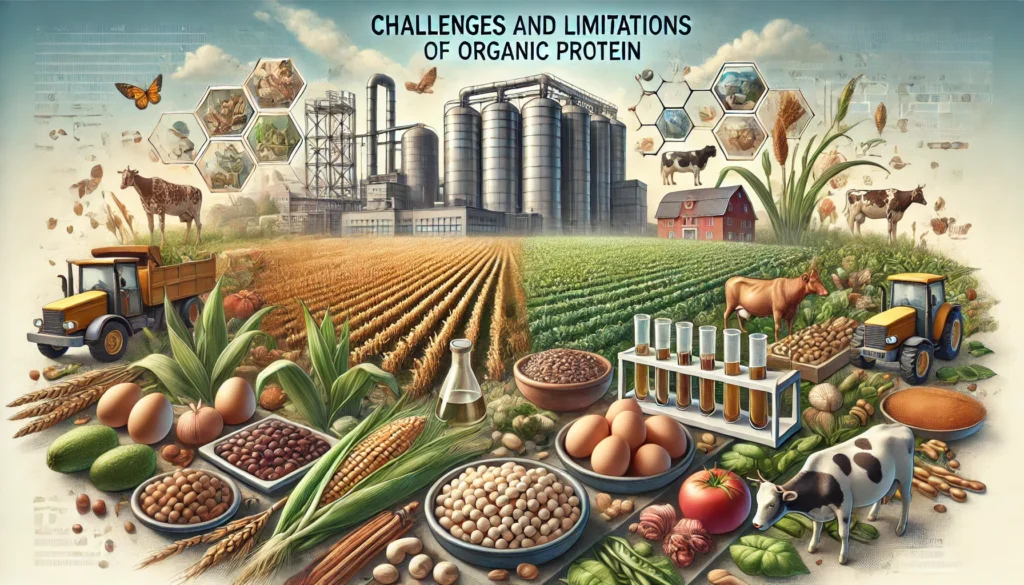
1. Availability Issues
One of the primary challenges faced by consumers looking to incorporate organic protein into their diets is its availability. Unlike conventional protein sources, organic options are not as ubiquitous. Many rural areas and smaller cities have limited access to organic markets or specialty stores that stock organic meats and plant proteins. Even in urban areas, the range can be limited, affecting consumer choice and convenience.
2. Mislabeling and Fraud
The organic food market is prone to mislabeling and fraud due to higher prices and increasing demand. Some producers may falsely label their products as organic to attract premium prices. This not only undermines consumer trust but also jeopardizes the integrity of genuine organic farmers. Regulatory bodies often struggle to monitor and enforce organic standards across the vast food production and supply chain, leading to gaps that unscrupulous entities might exploit.
3. Overcoming Taste and Texture Differences
Organic proteins can differ significantly in taste and texture from their conventionally produced counterparts. For instance, organic meat might be leaner and less marbled, leading to a different mouthfeel and flavor profile. Similarly, organic plant-based proteins like legumes and grains might have a more robust and earthy taste, which can be off-putting for some consumers. Adjusting recipes and cooking methods to suit these characteristics can require a learning curve for those accustomed to conventional products.
Future of Organic Protein
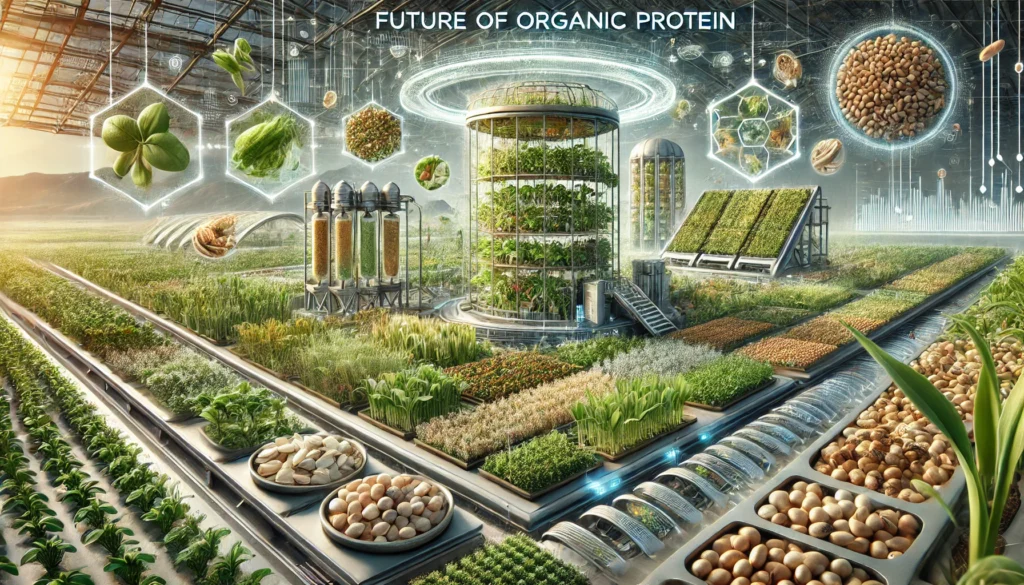
1. Trends in Organic Farming
Organic farming is on a trajectory of growth driven by consumer awareness and concern for health, the environment, and animal welfare. There is a trend towards using more sustainable practices such as permaculture and biodynamic farming within the organic sector. Additionally, the rise in consumer demand is pushing large agribusinesses to invest in organic farming, potentially increasing the availability of organic proteins.
2. Technological Advancements
Technology plays a pivotal role in shaping the future of organic protein. Innovations in biotechnology, such as the development of organic aquafeed for fish farms or enhancements in crop yield and pest resistance for organic feed grains, are likely to make organic protein more accessible and affordable. Moreover, blockchain technology could improve traceability and authenticity, reducing fraud and ensuring that consumers get genuine organic products.
3. Predictions for Consumer Behavior
As awareness of environmental and health issues increases, consumer behavior is expected to continue trending towards more sustainable and ethical food choices, including organic proteins. Younger generations, like Millennials and Gen Z, who prioritize sustainability, are likely to drive long-term growth in the organic market. Additionally, as more people adopt plant-based diets, the demand for organic plant proteins is expected to rise, potentially leading to a broader range of innovative organic protein products on store shelves.
Conclusion
Embracing the Organic Protein Revolution
he journey towards integrating organic protein into our diets is marked by both challenges and promising prospects. As consumers become increasingly health-conscious and environmentally aware, the demand for organic protein continues to grow, reflecting a collective shift towards more sustainable and ethical eating practices. Despite the hurdles such as availability issues, mislabeling, and adjusting to taste differences, the organic protein market is ripe with opportunities for innovation and improvement.
Advancements in farming technology and stricter regulatory oversight can mitigate many of the current challenges, making organic protein more accessible and trustworthy. As the market evolves, we can anticipate more diverse offerings and improved supply chains that bring organic protein into the mainstream with greater ease.
Ultimately, the choice to consume organic protein is not just about personal health benefits but also about participating in a larger movement towards a more sustainable and ethical world. By opting for organic, consumers contribute to a market that values animal welfare, environmental health, and the well-being of future generations. Embracing organic protein is, therefore, a powerful step towards nurturing our bodies, our communities, and our planet.
Frequently Asked Questions (FAQs) about Organic Protein
Q.1. What are the primary differences between organic and non-organic protein sources?
Organic protein sources come from animals that have been raised without the use of synthetic hormones or antibiotics and have consumed organic feed. Plant-based organic proteins are derived from crops grown without synthetic pesticides or genetically modified organisms. Non-organic proteins may not adhere to these strict guidelines, potentially leading to residues of pesticides, antibiotics, or other chemicals in the final product.
Q.2. How can I verify that the protein I purchase is truly organic?
Look for certifications on product labels, such as the USDA Organic seal in the United States or the EU organic logo in Europe. These certifications indicate that the product has met strict production and processing standards. Additionally, you can research the brand or farm to ensure their practices align with organic standards.
Q.3. Are there any nutritional benefits to choosing organic protein over conventional protein?
Organic proteins often have a better fatty acid profile, including higher levels of omega-3 fatty acids, due to the animals’ organic feed and better living conditions. Furthermore, organic proteins are less likely to contain residues from antibiotics and synthetic hormones, which some consumers prefer to avoid for health reasons.
Q.4. Is organic protein suitable for all diets, including vegan and vegetarian?
Yes, there are organic protein options suitable for every diet. Vegetarians and vegans can opt for organic plant-based proteins such as lentils, chickpeas, quinoa, and soy products, all of which can be grown and processed according to organic standards.
Q.5. Does organic protein taste different from conventional protein?
Some consumers report a more natural and robust flavor in organic proteins, particularly in meat and dairy products, due to the animals’ healthier diets and living conditions. Plant-based organic proteins might taste fresher or have a more pronounced flavor due to the absence of synthetic chemicals
